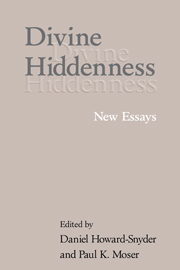Book contents
- Frontmatter
- Contents
- List of Contributors
- Introduction: The Hiddenness of God
- 1 What Is the Problem of the Hiddenness of God?
- 2 What the Hiddenness of God Reveals: A Collaborative Discussion
- 3 Deus Absconditus
- 4 St. John of the Cross and the Necessity of Divine Hiddenness
- 5 Jonathan Edwards and the Hiddenness of God
- 6 Cognitive Idolatry and Divine Hiding
- 7 Divine Hiddenness: What Is the Problem?
- 8 A Kierkegaardian View of Divine Hiddenness
- 9 The Hiddenness of God: A Puzzle or a Real Problem?
- 10 Seeking But Not Believing: Confessions of a Practicing Agnostic
- 11 The Silence of the God Who Speaks
- Bibliography
- Index of Names
- Index of Subjects
11 - The Silence of the God Who Speaks
Published online by Cambridge University Press: 10 November 2009
- Frontmatter
- Contents
- List of Contributors
- Introduction: The Hiddenness of God
- 1 What Is the Problem of the Hiddenness of God?
- 2 What the Hiddenness of God Reveals: A Collaborative Discussion
- 3 Deus Absconditus
- 4 St. John of the Cross and the Necessity of Divine Hiddenness
- 5 Jonathan Edwards and the Hiddenness of God
- 6 Cognitive Idolatry and Divine Hiding
- 7 Divine Hiddenness: What Is the Problem?
- 8 A Kierkegaardian View of Divine Hiddenness
- 9 The Hiddenness of God: A Puzzle or a Real Problem?
- 10 Seeking But Not Believing: Confessions of a Practicing Agnostic
- 11 The Silence of the God Who Speaks
- Bibliography
- Index of Names
- Index of Subjects
Summary
Silence is of many sorts. There's the silence of the countryside on a still winter's night, when all the animals are sleeping and all the insects hibernating. There's the silence of Amsterdam on the eve of the fifth of May, when the entire old city halts for fifteen minutes to memorialize those who fell in the war and were silenced. There's the silence of the mute, and the silence of rocks, hills, and valleys. There's the silence in music, silence as essential to the music as the sounds. There's the silence of the audience chamber when the imminent entrance of the queen is announced. And there's the hush of the cosmos that the psalmist enjoins when he announces: “The Lord is in his holy temple, let all the earth keep silence before him.”
The silence of which I will be speaking is unlike all of those. It's the silence of the biblical God – the biblical God being a God who is not only capable of speaking but has on many occasions spoken. More specifically, I will be speaking of the biblical silence of the biblical God. The biblical silence of God is the nonanswering silence of God. It's like the silence of the parent who doesn't answer when the child asks “Why? Why did it happen? Where were you?” It's the silence which the poet of Psalm 83 pleads with God to break: “O God, do not keep silence; do not hold thy peace or be still, O God!”
Biblical Silence
The Bible – both the Hebrew Bible and the Christian Bible – represents God as having spoken.
- Type
- Chapter
- Information
- Divine HiddennessNew Essays, pp. 215 - 228Publisher: Cambridge University PressPrint publication year: 2001
- 3
- Cited by



